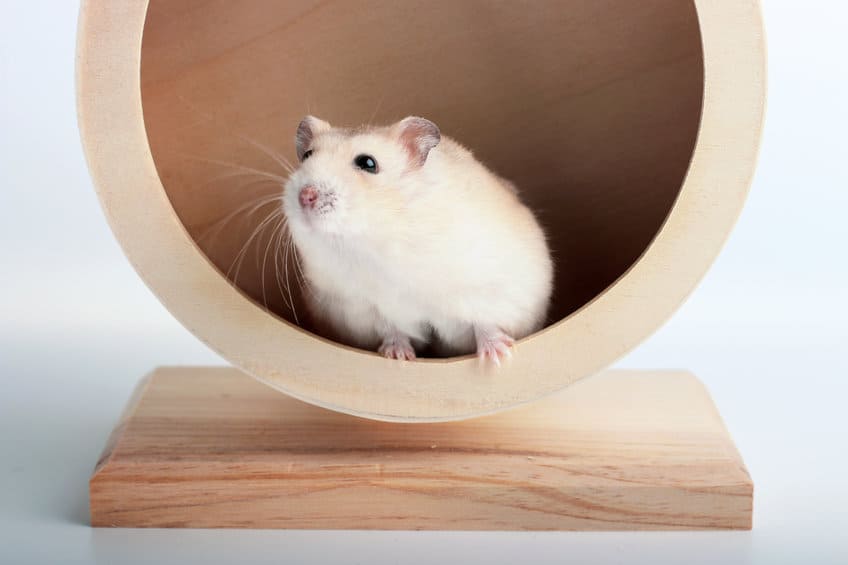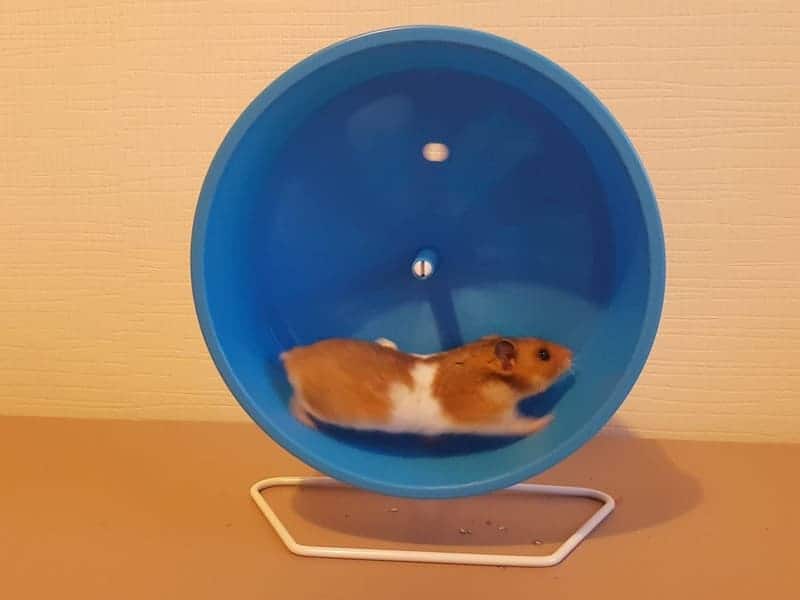While most people who own or are interested in hamsters know that one way that hamsters like to spend their time is running on a colorful plastic wheel, it is not always so clear why that is. The truth is, for the most part, it is just something that they find fun. However, in this article, we are going to dive deeper into the reasons why your hamster runs on his wheel while also answering some other frequently asked questions about hamsters and their wheels.
3 Reasons Why Your Hamster Enjoys His Wheel
1. It Is Just Natural and Instinctive
Hamsters are small creatures, but they are fast and can run for long distances very easily. In fact, in the wild, hamsters are known to run for upwards of five miles (about 8 kilometers) in a single night. They do this to look for food and other resources or to escape from predators. Because running for a long distance is necessary for a hamster’s survival in the wild, it is something they are born knowing how to do.
In an enclosure, it is impossible for a hamster to run these types of long distances because there is only so much space. That is where hamster wheels come in. They operate as a great outlet for your hamster’s natural desire to run for long periods of time, especially at night. If you want to care for your hamster the proper way, a hamster wheel is an essential item for him to have.
2. It Is Great Fun
Beyond your hamster instinctively wanting to run, there is evidence that hamsters actually really enjoy the experience. Researchers have found that when hamsters run on a wheel, they get flooded with endorphins, just like humans do when we exercise. This produces an effect that humans like to call a “runner’s high.” When your hamster hops on his wheel, he might be seeking those natural, feel-good chemicals.
3. Curiosity Plays a Part
Hamsters are naturally very curious animals who love to explore. You will quickly notice this if you give your hamster some time outside of his enclosure in a controlled space. Once put down, your hamster will likely start to sniff and run around, exploring his new surroundings. Some researchers have proposed that running on a wheel helps satisfy this curiosity and desire to explore when their cage otherwise limits them.
How Long Do Hamsters Normally Use Their Wheel?

You can expect your hamster to run on his wheel mostly at night because hamsters are nocturnal animals, but this is not to say that your hamster will never run on his wheel during the day. While it is hard to say exactly how long your hamster will run on his wheel, they usually run for about 4 to 6 hours every single day, covering a total of around 6-8 miles (spread out throughout the day).
However, this answer depends a lot on a variety of different factors, such as your hamster’s age, diet, and temperament. Some people report that their hamsters run close to 12 hours every single day! Even this type of seemingly excessive running is not a cause for concern unless there is evidence that your hamster is wearing himself out or ignoring the pain. We will talk more about potential signs that your hamster is running too much in the section, “Can A Hamster Become Addicted To His Wheel?”
As far as how often you can expect hamsters to use their wheel, most hamsters will get on their wheel several times every day.
Do Hamsters Always Need A Wheel?
Yes, your hamster does need some sort of wheel in his enclosure. In fact, many enclosures that you buy will come with a wheel, though you should always check to see if that wheel is safe/the right size for your hamster.
Hamster wheels are necessary for both your hamster’s physical health and psychological health. As far as physical health goes, the wheel allows your hamsters to burn off calories better than pretty much any other activity in their enclosure allows them to do. While obesity is quite rare in hamsters in the wild, it is actually a rather common health problem for hamsters in captivity.
Additionally, hamsters will also become extremely bored and possibly even depressed if they do not have a way to let out their pent-up energy and desire to run. Even if you are lavishing your hamster with the care and attention he needs, it might not be enough to keep him healthy and happy without a wheel.
Can a Hamster Become Addicted To His Wheel?

Most hamsters are fairly adept at knowing what their limits are and will get off their wheel when they start to grow tired. However, it is possible for hamsters to become addicted to running on their wheels, in which case they will not stop running even when it is necessary for them to do so. There are a couple of different reasons that this may happen.
- Boredom: Your hamster may be bored; this is especially likely if your hamster does not have a large enough enclosure or if you never give your hamster time outside of the cage to explore.
- A high-energy diet that causes hyperactivity;
- Not enough toys are available in the enclosure.
There are a few different signs to be on the lookout for if you believe that your hamster is developing an addiction to running on his wheel.
First, if your hamster is developing sores or blisters on his feet. This could be a sign that your hamster’s wheel is not a great wheel, but it also can be a sign that your hamster is addicted to his wheel.
Second, if you notice excessive exhaustion or signs of dehydration.
Finally, if a mother hamster is neglecting her young babies to run on the wheel, it could be a sign of addiction.
If your hamster is becoming addicted to the wheel, you may want to consult your vet about changing his diet, make sure you provide your hamster with enough toys and time outside of his enclosure, and if all else fails, remove the wheel for certain periods of time each day.
Are Wheels Good and Safe For Hamsters?
Yes, wheels are good for hamsters. As long as your hamster is not becoming addicted to running on the wheel, it is a very healthy habit and in many ways needed.
However, to answer the question of whether or not hamster wheels are safe, you have to consider individual wheels. Wheels with metal bars or harsh mesh are often considered unsafe for hamsters.
Additionally, if you get a wheel that is not the right size for your hamster (either too big or too small), it can be dangerous for your beloved pet. Check out the next section for some tips on how to choose a safe hamster for your furry friend.
How Do I Choose A Good Wheel For My Hamster?
There are a few things that you want to consider when you are choosing a wheel for your hamster: stability, durability, size, material, and noise level. Let’s start with stability. You do not want a wheel that will topple over and potentially hurt your hamster while he is running on it. You also want to make sure that the wheel you choose is durable, so you do not have to end up replacing it right away if your hamster is an avid runner or decides to chew on it.
Next, you need to consider the size of the wheel. The exact size you need depends on your hamster, but if your hamster has to bend/arch his back to use the wheel, it is likely too small. If your hamster struggles to get the wheel to turn or ends up out of control, it is likely too big.
A general size guide is a minimum of 10″ (26 cm) for Syrian hamsters and at least 8″ (21 cm) for other dwarf species.
You want to avoid wheels made with metal bars or with small holes or gaps that your hamster’s feet or tail could get trapped in while he is running. This could cause serious injury or lead to the development of sores and blisters.
Finally, since hamsters are nocturnal, you are going to want to look for a wheel that is relatively quiet and will not keep you up at night. This is especially true if you keep your hamster’s enclosure in your bedroom.
What If My Hamster Is Not Using His Wheel?
There are a couple of reasons why your hamster might not be using his wheel. The most common is that the wheel is not comfortable for your hamster either because it is the wrong size or because it is made of a material that is not comfortable for your hamster’s feet. If your hamster is otherwise acting normal and active, this is likely the problem.
If your hamster is not using his wheel and showing signs of fatigue/seems lethargic, it could be a sign of a greater issue. If these behaviors persist, you may want to take your hamster to your local vet.
Finally, if you just brought your hamster home, it could be because he does not know what the wheel is for. While hamsters do not typically need to be taught how to use the wheel, you might try using some bits of food or treats to entice your hamster to investigate it.
Related articles













